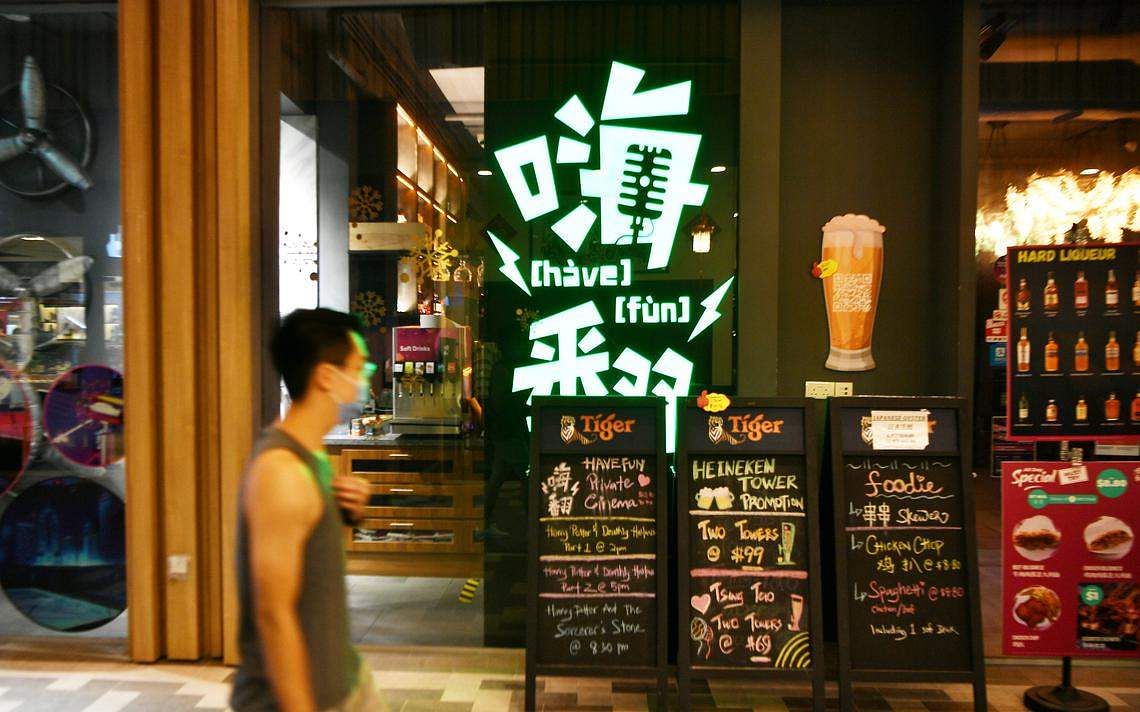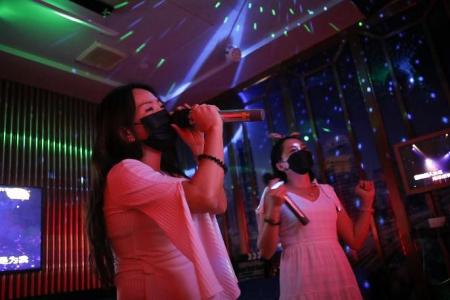Karaoke operators worry Covid-19 surge may impact their business
Karaoke operators finally opened their doors to guests six months ago, but they are worried that the recent surge in Covid-19 infection numbers may mean a return to restrictions – a move they say could mean curtains for some of them.
Mr Frank Per, who manages Sing My Song KTV, which has two outlets, said business quickly returned to normal after the authorities allowed all nightlife businesses in Singapore to fully open from April 19 after a two-year pause.
He received about $100,000 in rental relief from the Government because of the forced closure, but made losses of about $1 million, which he is now slowly recuperating.
“Our industry was one of the first to close and the last to reopen; I suffered a lot of stress and couldn’t really sleep or rest well for the two years of closure,” he said.
“If we are forced to close again, I think many businesses in the nightlife sector will collapse. Another round like what we experienced for the two years will definitely wipe us out entirely.”
Operators say business has bounced back to pre-pandemic levels, with some seeing a surge in bookings.
Mr Caine Poon, the marketing director of Cash Studio, which has five outlets in central and east Singapore, said patrons were excited when it was announced that karaoke clubs could reopen their doors.
“The phones were ringing non-stop as people called to make bookings, and business was explosive and booming,” he said. “We didn’t have enough manpower to handle all the calls, but it was a happy problem.”
For the two years that it was closed, the chain received more than $100,000 in government assistance through rental relief and salary support, but it still lost more than $3 million and half of its 80-man team.
Mr Poon said the initial surge in business was not realistic nor sustainable. “People were just rushing to sing karaoke because they were deprived for two years. As at September, it has slowed down by 20 per cent to more sustainable, pre-pandemic levels,” he said.
After nightlife businesses were forced to close in March 2020 because of the Covid-19 pandemic, some attempted to pivot and operate as food and beverage outlets, among other things.
But a few rogue operators continued to function as KTV outlets under the guise of having pivoted.
They were discovered through the emergence of a Covid-19 cluster in July 2021 that involved transmission of the virus through hostesses.
It was another blow to legitimate operators, as the Ministry of Health suspended operations of about 400 nightlife establishments, which had pivoted to become food and beverage outlets, for two weeks.
Mr Poon said these rogue operators gave the whole industry a bad name. “Those illicit KTVs are very different from us, with a different group of customers. But even now, many of them have come back.”
There were others that shuttered for good. Japanese chain Manekineko was forced to close all eight of its outlets here in 2021 after it said it was given no prospect of resuming operations.
The Covid-19 wave caused by the XBB variant started growing around mid-October, and it now has operators worried.
There were more than 11,000 new daily cases recorded on Oct 11 and 18.
Although infections dipped to 2,994 new Covid-19 cases on Oct 25, which was also a Tuesday, infectious diseases experts said that could be because people may have put off seeing a doctor over the Deepavali long weekend.
A spike in infections after the weekend, when more people are out in social settings, contributes to the higher case numbers typically seen on Tuesdays.
Amid the increase, Health Minister Ong Ye Kung said in October that Singapore would not rule out tightening measures, including mandatory mask-wearing, but added that the authorities would try their best not to disrupt lives.
Mr Per worked in contingency plans for Sing My Song KTV’s outlet at Kinex Mall, in Tanjong Katong, which opened in September.
“Just in case something happens again, we designed the new outlet with a large main hall, so that if needed, we can convert the area to pivot to a food and beverage outlet,” he said.
“Right now we are very worried about forced closures and even if they only make everyone wear masks again, it’ll affect us quite badly.”
He said that during the two years of closure, he could not pivot the business as the outlet in Jurong was just a series of rooms.
Mr Flint Lu, the founder of HaveFun Karaoke, which has eight outlets islandwide, said that the closures almost bankrupted the chain.
“We lost more than 40 staff, which was more than half our employees and two-thirds of middle management,” he added.
“It was a painful and deadly period that we went through. We can’t afford to go through that another time.”
He said that even if operators are not forced to close, expecting people to sing with their masks on would hurt the karaoke scene.
“Business will be badly affected not just by the restrictions – it’s also about damage to confidence,” Mr Lu said. “It is hard to understand why singing is more dangerous than eating and talking in restaurants.”

The Covid-19 multi-ministry task force had taken a strong position against activities like mass singing because of the higher risk of transmission.
Infectious diseases experts said then that nightlife businesses like karaoke establishments also involved activities with a higher risk of transmission and a lower chance of adherence to mask-wearing and safe distancing.
Karaoke operators are urging the public to be responsible, even if it means a slight decline in business.
There are currently no vaccination restrictions or pre-test requirements for karaoke outlets, but people who test positive are still required to self-isolate for at least 72 hours.
Mr Per said: “Right now people are very daring, treating Covid-19 like it’s just a flu. But I hope everyone will be responsible, so that we won’t be forced to shut for good.
“If you are sick or not feeling well, please isolate yourselves. Don’t come to our karaoke outlets to sing.”
Get The New Paper on your phone with the free TNP app. Download from the Apple App Store or Google Play Store now



